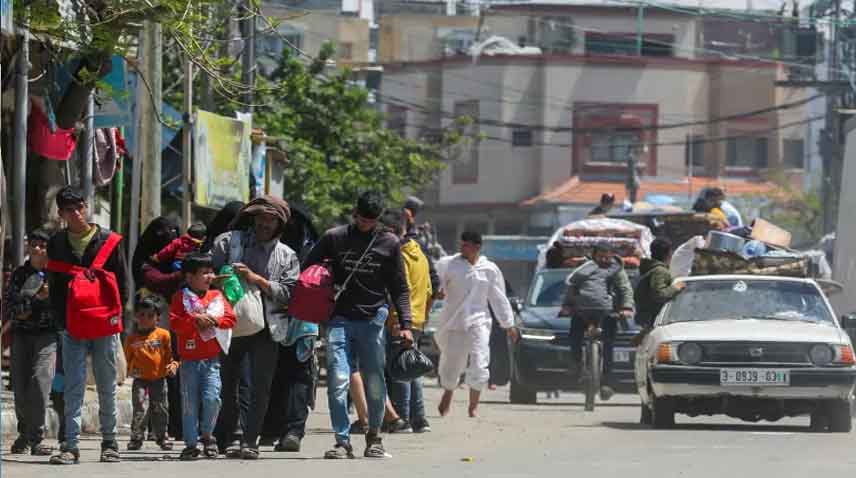
Meanwhile, thousands of people flee eastern Rafah after Israel orders people to evacuate as fears of a full-blown military assault on the city sheltering more than one million displaced people grow.
Khalil al-Hayya confirmed to Al Jazeera that there are three phases to the ceasefire deal, but added that mediators had told Hamas that the United States president was committed to ensuring the implementation of the agreement.
There has been no confirmation of this from the American side.
Al-Hayya added that the first phase would see the return of displaced Palestinians in Gaza to their homes, and the flow of aid, fuel and relief materials into Gaza.
He added that 50 Palestinian prisoners would be released for each female captive held by Hamas in that first phase. In the second phase, Hamas would release male captives for an undetermined number of Palestinian prisoners.
The third phase of the agreement would include the start of the implementation of a reconstruction plan for a period of three to five years.
Turkish President Recep Tayyip Erdogan has welcomed the announcement by Hamas that it has accepted a proposal for a ceasefire in Gaza, adding he hopes Israel would do the same.
Speaking after a cabinet meeting, Erdogan called on Western countries to increase pressure on Israel’s leadership to accept the deal.
“We welcome the statement by Hamas that they accepted the ceasefire with our suggestion. Now, Israel must take the same step,” he said.
State Department spokesperson Matthew Miller says Washington will “withhold judgement” on Hamas’s response to the ceasefire proposal until it has time to fully review it.
“I can confirm that Hamas has issued a response. We are reviewing that response now and discussing it with our partners in the region,” he said.
Miller declined to say whether Hamas agreed to a US-approved offer or to a different version of the proposal.
“As you know, [CIA] Director Burns is in the region working on this in real time. We will be discussing this response with our partners over the coming hours,” he continued.
Israel’s far-right national security minister, Itamar Ben-Gvir, has responded to Hamas’s agreement to a truce proposal. He says the group is playing “games” that have only “one answer, an immediate order to occupy Rafah!”
“Increasing military pressure, and continuing the complete defeat of Hamas, until its complete defeat,” he added in a social media post.
Ben-Gvir has been among the members of the Israeli government urging Netanyahu to continue fighting in Gaza until Hamas is defeated.
Former Israeli diplomat Alon Liel has spoken to Al Jazeera about the situation Israel’s government and Netanyahu are finding themselves in after Hamas’s announcement.
“There is strong pressure from inside Israel on the government to go to Rafah, so I think the Israeli government faces a dilemma to go with the world or to go with the Israelis, to keep the government or to keep our international contacts,” he said.
“It’s a huge decision for Israel, really huge,” Liel added, noting that even if there is a deal, many people in Israel “will be frightened that we lost the war or that Hamas stays in Gaza”.
He went on to say: “If he [Netanyahu] accepts a deal, it might be the end of his political career. But then if he doesn’t accept a deal, we will have a series of international decisions against us in international courts, in the UN, by different governments, sanctions, recognition of Palestine.
“So I see it as a historic decision for Netanyahu.”
Sources have told Al Jazeera that the Egyptian-Qatari proposal Hamas has agreed to would include three phases, with each lasting 42 days.
A truce would begin in the first phase, along with an Israeli withdrawal from the Netzarim corridor that Israel uses to divide northern and southern Gaza.
A second phase would include the approval of a permanent cessation of military and hostile operations, and the complete withdrawal of Israeli forces from Gaza.
The proposal also includes a provision approving an end to the blockade of Gaza in the third phase.




